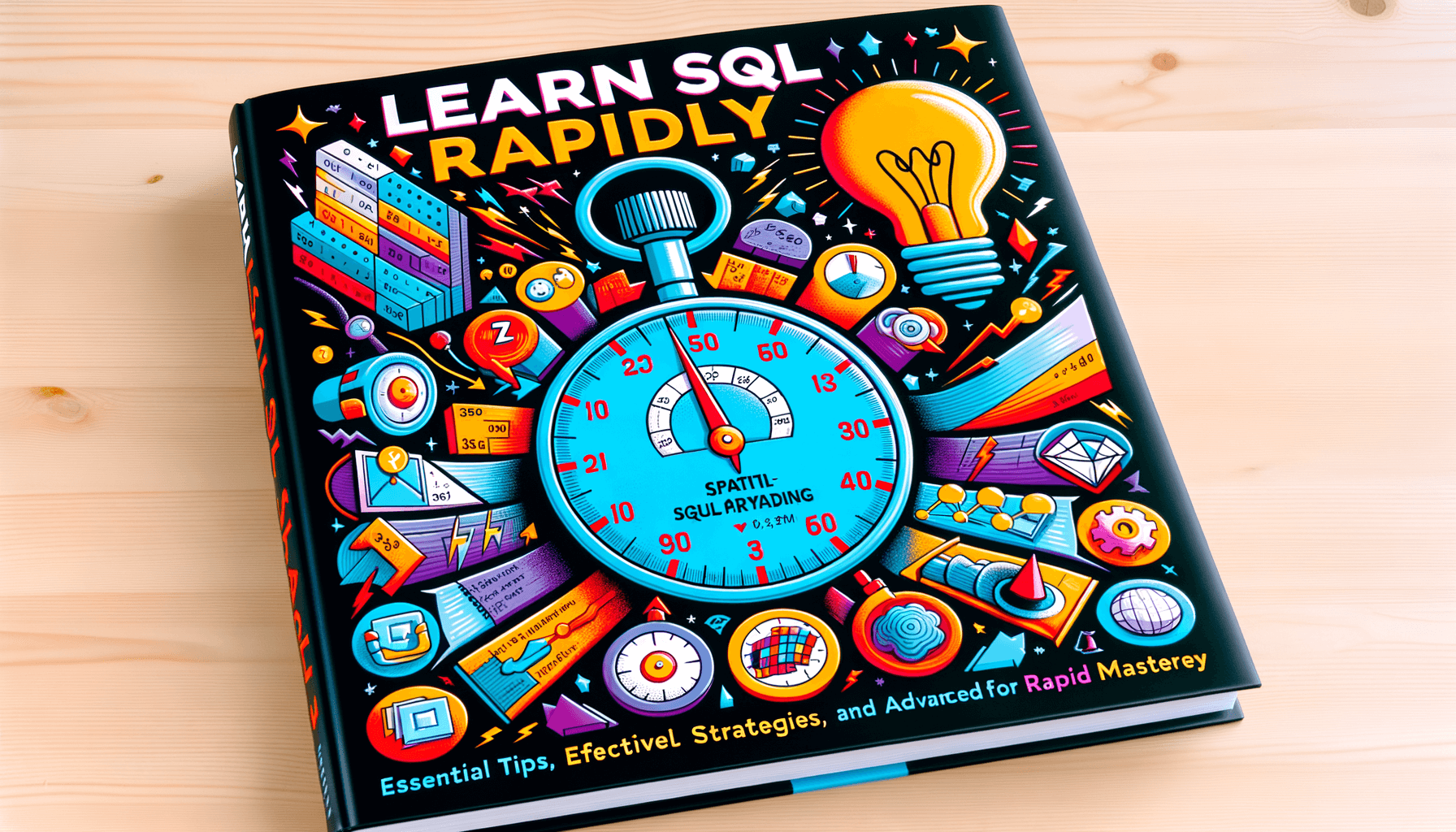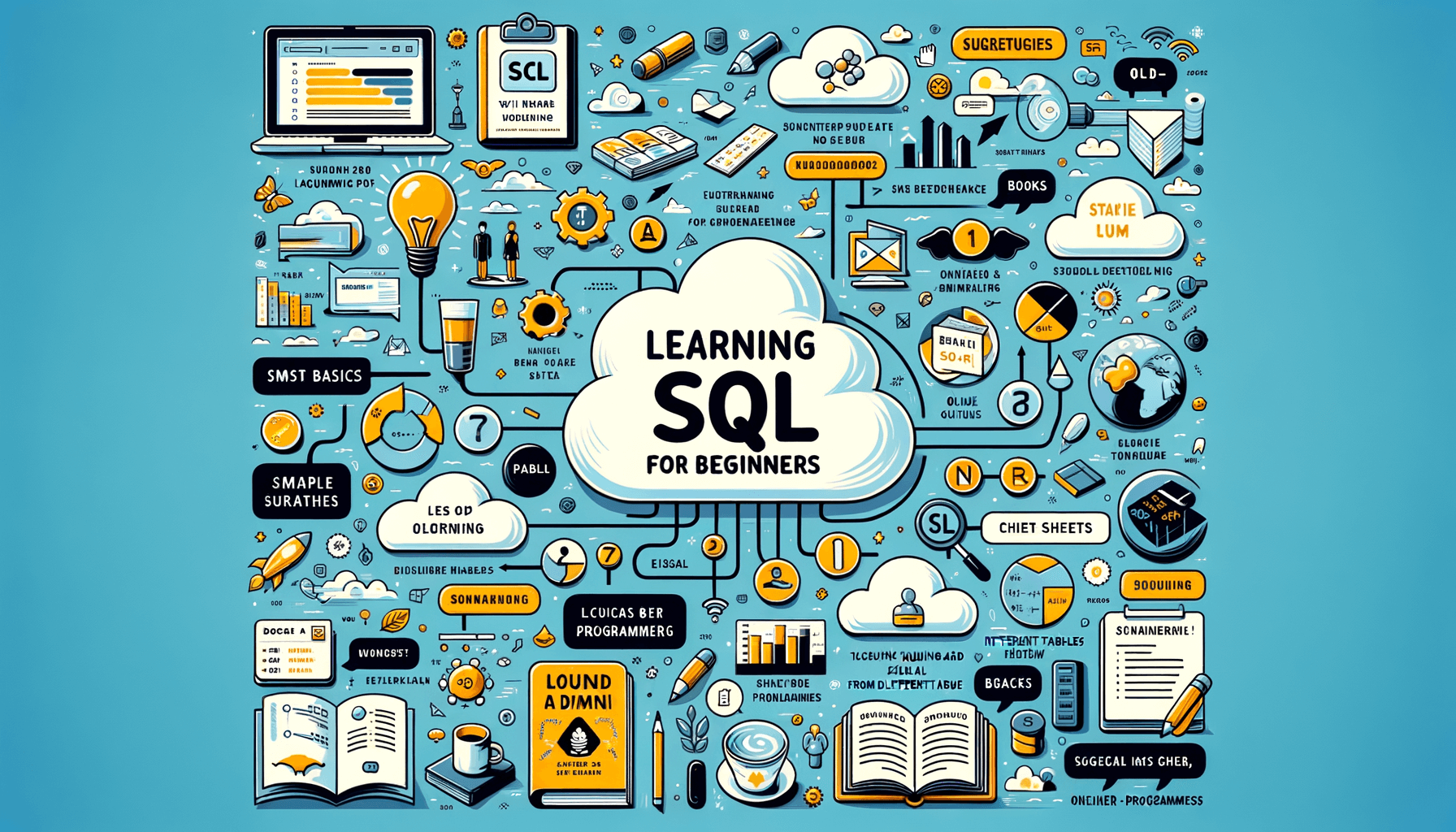A big variety of articles and resources

How to Learn SQL Fast: Tips and Tricks for Rapid Mastery
 Sia Author and Instructor
Learn SQL
Sia Author and Instructor
Learn SQL
9 minute read
Learning SQL can seem tough at first, but with the right tips and tricks, you can pick it up quickly. SQL is a key tool for managing and analyzing data. Whether you're aiming to work in data science, web development, or any tech field, SQL is a must-have skill. This article will guide you through the basics, share effective learning strategies, and introduce advanced techniques. We'll also cover common mistakes and how to avoid them, and show you how to use SQL professionally. Finally, we'll talk about how to keep improving your SQL skills over time.
Key Takeaways
- Start with the basics of SQL to build a strong foundation.
- Use active learning and real-world projects to practice SQL.
- Learn advanced techniques like complex queries and performance optimization.
- Watch out for common errors and learn how to fix them.
- Keep your skills up-to-date by engaging with the community and taking advanced courses.
Understanding the Basics of SQL
The Importance of SQL in Data Management
SQL is a powerful tool for managing and manipulating data. It is essential for anyone working with databases. Understanding SQL allows us to efficiently retrieve and analyze data, making it a crucial skill in today's data-driven world.
Core Concepts and Terminology
Before diving into SQL, it's important to grasp the core concepts and terminology. This includes understanding tables, rows, and columns, as well as knowing what queries, joins, and indexes are. These basics form the foundation of SQL and are necessary for mastering more advanced techniques.
Setting Up Your SQL Environment
To start learning SQL, we need to set up our environment. This involves installing a database management system (DBMS) like MySQL or PostgreSQL. There are many online resources, such as sqlskillz.com vs w3schools.com, that offer step-by-step guides for setting up your SQL environment. These platforms are perfect for beginners and allow you to learn at your own pace without needing a credit card to sign up.
Setting up your SQL environment is the first step towards mastering SQL. It provides a hands-on experience that is crucial for understanding how SQL works in real-world scenarios.
Effective Learning Strategies for SQL
Active Learning Techniques
To learn SQL quickly, we need to engage in active learning. This means not just reading about SQL but actually writing and running SQL queries. Hands-on practice is crucial. We can start with simple queries and gradually move to more complex ones. This approach helps us understand the syntax and logic of SQL better.
Utilizing Online Resources and Tutorials
There are many online resources available to help us learn SQL. Websites like sqlskillz.com vs codecademy.com offer courses that are perfect for beginners. These platforms allow us to learn at our own pace, and we can practice as much as we need without any pressure. No credit card is required to sign up, making it easy to get started.
Practice Through Real-World Projects
Applying what we've learned in real-world projects is one of the best ways to master SQL. We can start by working on small projects, like creating a database for a personal project or analyzing a dataset we're interested in. This not only reinforces our learning but also makes it more enjoyable.
By combining active learning, utilizing online resources, and practicing through real-world projects, we can rapidly master SQL and become proficient in no time.
Advanced SQL Techniques for Rapid Mastery
Mastering Complex Queries
To truly excel in SQL, we need to master complex queries. These queries often involve multiple tables and intricate conditions. Understanding how to write and optimize these queries can significantly enhance our data retrieval capabilities. We should practice writing nested queries and using functions like GROUP BY and HAVING to filter our results effectively.
Optimizing SQL Performance
Performance optimization is crucial when working with large datasets. We can achieve this by indexing key columns, avoiding unnecessary columns in our SELECT statements, and using joins efficiently. Here are some tips:
- Use indexes to speed up data retrieval.
- Avoid using SELECT *; specify only the columns you need.
- Use joins instead of subqueries where possible.
Understanding Joins and Subqueries
Joins and subqueries are fundamental to SQL. Joins allow us to combine data from multiple tables, while subqueries let us perform operations within a query. It's essential to understand the different types of joins (INNER, LEFT, RIGHT, FULL) and when to use them. Subqueries can be used in SELECT, INSERT, UPDATE, and DELETE statements to add more power to our SQL commands.
By mastering these advanced techniques, we can handle more complex data tasks and improve our efficiency in managing databases.
Common Pitfalls and How to Avoid Them
Identifying and Correcting Syntax Errors
When learning SQL, one of the first challenges we face is dealing with syntax errors. These errors can be frustrating, but they are a normal part of the learning process. Paying close attention to detail is crucial. Simple mistakes like missing commas or incorrect capitalization can cause errors. To avoid these, we should always double-check our queries before running them.
Avoiding Common Logical Mistakes
Logical mistakes can be harder to spot than syntax errors. These occur when our queries run without errors but don't return the expected results. To prevent this, we should break down our queries into smaller parts and test each part individually. This way, we can identify where the logic goes wrong and fix it.
Ensuring Data Integrity
Maintaining data integrity is essential when working with databases. We must ensure that our data remains accurate and consistent. One way to do this is by using constraints like primary keys and foreign keys. These constraints help us maintain the relationships between different tables and prevent inaccurate data from being entered.
Remember, mastering SQL takes time and practice. By being aware of these common pitfalls and learning how to avoid them, we can become more proficient in SQL and handle data more effectively.
Leveraging SQL in Professional Settings
SQL in Data Analysis and Reporting
In the world of data analysis, SQL is a powerful tool. It helps us pull and examine data quickly. For a data analyst, knowing SQL is a must. It allows us to create detailed reports and find trends in the data. This skill is valuable in many jobs.
Integrating SQL with Other Technologies
SQL works well with other technologies. We can use it with programming languages like Python or R. This makes it easier to handle and analyze data. By combining SQL with these tools, we can build more complex and useful applications.
Building a Portfolio with SQL Projects
Creating a portfolio of SQL projects is a great way to show our skills. We can include projects that show different aspects of SQL, like data management and optimization. This can help us stand out when looking for jobs.
Building a strong portfolio with SQL projects can make a big difference in our job search. It shows potential employers what we can do and how we can add value to their team.
Continuous Improvement and Staying Updated
Keeping Up with SQL Updates and Best Practices
To stay ahead in SQL, we need to keep up with the latest updates and best practices. SQL is always evolving, and new features can make our work easier and more efficient. We should regularly check for updates and learn how to use new tools and functions.
Engaging with the SQL Community
Being part of the SQL community can help us learn faster and solve problems more easily. We can join forums, attend webinars, and participate in online discussions. Websites like sqlskillz.com and datacamp.com offer great resources for beginners and experts alike. By engaging with others, we can share knowledge and get new ideas.
Pursuing Advanced Certifications and Courses
Getting advanced certifications and taking courses can boost our SQL skills. Many online platforms offer courses that we can take at our own pace. These courses often cover advanced topics and provide hands-on experience. By earning certifications, we can show our expertise and improve our job prospects.
Continuous learning is key to mastering SQL. By staying updated and engaging with the community, we can keep improving our skills and stay ahead in our careers.
Continuous improvement is key to staying ahead in today's fast-paced world. Our courses are designed to help you keep your skills sharp and up-to-date. Whether you're looking to master SQL or other advanced technologies, we've got you covered. Visit our website to explore our course catalog and find the perfect course for you. Don't wait, start learning today!
Conclusion
Mastering SQL quickly is possible with the right approach and dedication. By focusing on the basics, practicing regularly, and using the right resources, anyone can become proficient in SQL. Remember to break down complex problems into smaller, manageable tasks and seek help when needed. With persistence and the right mindset, you can achieve your goal of learning SQL fast. Keep practicing, stay curious, and don't be afraid to experiment with different queries. Your hard work will pay off in the end.
Frequently Asked Questions
What is SQL and why is it important?
SQL stands for Structured Query Language. It's used to manage and manipulate databases. It's important because it helps in storing, updating, and retrieving data efficiently.
How long does it take to learn SQL?
The time it takes to learn SQL can vary. With dedicated study and practice, you can learn the basics in a few weeks. Becoming an expert might take a few months.
Do I need any special software to start learning SQL?
Yes, you'll need a database management system (DBMS) like MySQL, PostgreSQL, or SQLite. There are also online platforms where you can practice SQL without installing anything.
What are some good resources to learn SQL?
There are many online tutorials, courses, and books available. Websites like Codecademy, W3Schools, and Khan Academy offer great beginner resources.
How can I practice SQL in real-world scenarios?
You can practice by working on sample projects, like creating a database for a library or a store. Many online platforms also offer real-world problem sets to solve.
Can learning SQL help in getting a job?
Yes, SQL is a valuable skill in many fields like data analysis, web development, and database administration. Knowing SQL can make you a strong candidate for many jobs.
Related Articles

3 Juicy Secrets Behind Sluggish SQL!!
5 minute read

Can I learn SQL without any programming knowledge?
12 minute read

How Difficult Is SQL to Learn? A Comprehensive Guide
8 minute read




